#union labor
Explore tagged Tumblr posts
Text
UAW expands strikes
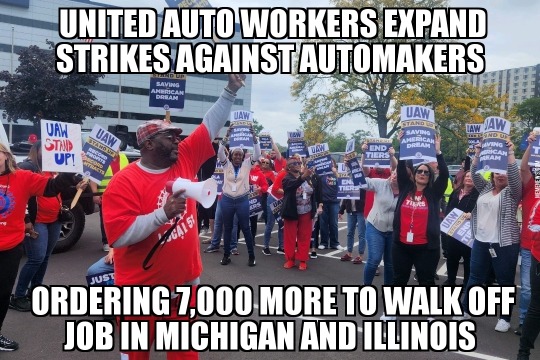
View On WordPress
#America#business#Chevrolet#chevy#chrysler#detroit#dodge#ford#meme#memes#news#organized labor#sellantis#strike#uaw#union#union labor#United Auto Workers#united states
43 notes
·
View notes
Text
SAG-AFTRA IS STRIKING AGAIN
This time, for video games.
Some key information:
They are striking so all performers will have protection against AI
The struck companies are those signed to the Interactive Media Agreement
The listed companies by SAG-AFTRA include Activision Productions Inc, Blindlight LLC, Disney Character Voices Inc, Electronic Arts Productions Inc, Formosa Interactive LLC, Insomniac Games Inc, Llama Productions LLC, Take 2 Productions Inc, VoiceWorks Productions Inc and WB Games Inc. Though this may not be everyone.
Important things from the FAQ:
Some games from struck companies are non-struck (due to the Collective Bargaining Agreement still being in effect)
Localisations will be affected if covered under the Interactive Localization Agreement
Actors who are part of SAG-AFTRA cannot work for non-union or independent/low-budged productions during the strike unless they are signed to an Interim Interactive Media Agreement, Interim Interactive Localization Agreement or a Tiered-Budget Independent Interactive Media Agreement
Similarly to the previous strike, struck work cannot be promoted. This includes accepting awards for performances in struck games. This does NOT include hosting/performing a skit at an awards show and San Diego Comic Con (the latter due to the close proximity to the calling of the strike)
As implied by the point above, SAG-AFTRA performers cannot partake in panels related to struck games or companies, including finished games produced by struck companies
The best way to check if a game is struck is to use the search tool provided by SAG-AFTRA
Most importantly: You are NOT being asked to stop playing video games, as highlighted in the FAQ for creators and streamers. This does NOT cross the picket line. Though please do talk about the strike and show your solidarity
I expect to see the same amount of support from y'all that we saw in the last strike. Just because it's video games doesn't mean performers deserve any less support and protection.
Also please reblog with any additions (with sources - we are NOT here to spread misinformation)! And please correct me if anything listed here is incorrect.
SOURCES:
Video Game Strike FAQs | SAG-AFTRA (sagaftra.org)
SAG-AFTRA Members Who Work on Video Games Go on Strike | SAG-AFTRA (sagaftra.org)
34K notes
·
View notes
Text
Joe Hill
The Labor Organizer -- died today in 1915....murdered by the Copper Mining owners
0 notes
Text
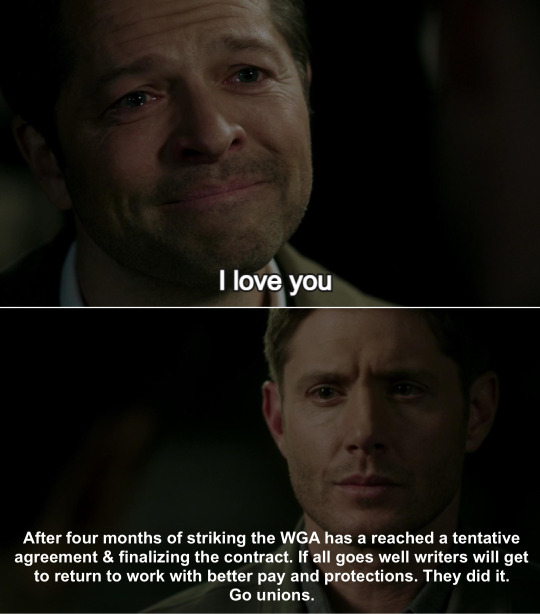
I’m so happy for them
[Image Description: Castiel from Supernatural is saying I love you, underneath is an image of Dean Winchester with the caption: “After four months of striking the WGA has a reached a tentative agreement & finalizing the contract. If all goes well writers will get to return to work with better pay and protections. They did it. Go unions”]
(Source)
#wga solidarity#wga strong#after months of watching union busting and anti union tactics#wga is coming out strong#hopefully sag is next!#writers strike#support unions#wga strike#sag strike#supernatural meme#destiel#destiel meme#workers rights#fuck the amptp#destiel news#mine#we’ve hit the note amount where people start fighting in the notes#stop fighting kids#but also the strike was absolutely necessary#withholding labor is how unions negotiate for better rights#the CEOs are multimillionaires who refused to pay proper wages#they needed to receive heavy losses so they’d actually come to the table listen to union demands
74K notes
·
View notes
Text
NEW UNION JUST DROPPED

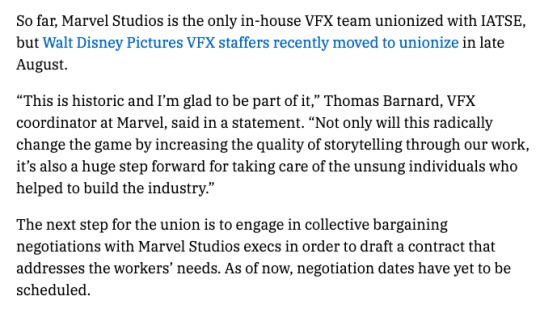
LET'S GOOOOOOO
#original post#marvel#mcu#hot labor summer#vfx#unions#wga strike#sag aftra strike#writers strike#actors strike
45K notes
·
View notes
Text
July 8, 2024 - Thousands of Samsung workers have declared an indefinite strike in South Korea, demanding better pay and benefits. [video]
#south korea#strike#samsung#tech workers#unions#workers#working class#industrial action#2024#video#labor movement#raised fist#red flag#solidarity#banner#hwaseong
9K notes
·
View notes
Text
'Over the years, it seems we have become accustomed to the idea that flame-throwing defines politics, but in fact, Biden’s reliance on slow, careful negotiation harks back to the eras when leaders sought to build coalitions and find common ground in order to pass legislation.
North America’s Building Trades Unions (NABTU) acknowledged the power of Biden’s approach today when it endorsed Biden for president in 2024. The union’s president, Sean McGarvey, noted that Trump had promised to protect pensions and to pass infrastructure laws that would help employment in the building trades, but did neither. In contrast, Biden worked to pass the American Rescue Plan, which protected pensions, and the Bipartisan Infrastructure Law, the Chips and Science Act, and the Inflation Reduction Act, which McGarvey said “have brought life-changing, opportunity-creating, generational change focused on the working men and women of this great country who have for far too long been clamoring for a leader to finally keep their word.”
#u.s. politics#union labor#politics#2024 elections#president biden#democratic party#fucking VOTE#NABTU
0 notes
Text
I also learned this in public school.
Luckily my teacher treated his kids like new coming adults instead of foolish teens.
He also showed us how the working conditions were, didn't spare much detail, he was a cool dude.
Without unions I'm sure we'd be working for corp bucks again and only able to spend that money back into work on related businesses to get food and housing.
Unions are the reason we get to complain freely. Unions are the reasons we get to seen as people working a job instead of a fleshy cog in the machine.
Unions are what we need to protect.

It is taught in public schools.
543 notes
·
View notes
Video
tumblr
join a union
the power of collection action
#tiktok#Adam Conover#collective action#union workers#labor unions#unions#protest#labor vs capital#labor rights#capital vs labor#labor movements#labor movement#workers rights#workers vs capital#workers#writers strike
37K notes
·
View notes
Text
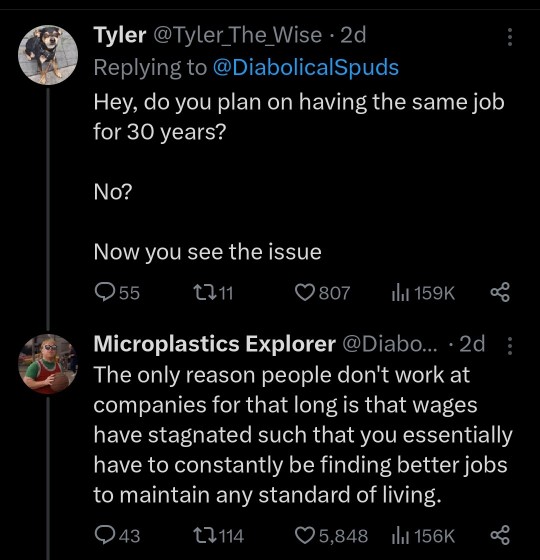


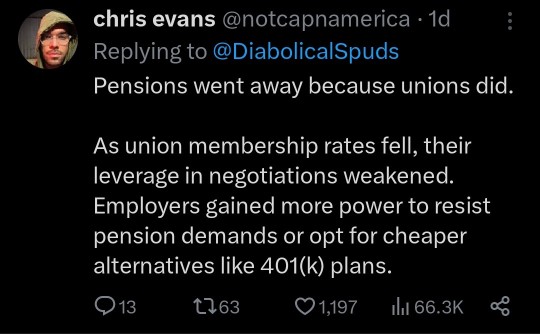
12K notes
·
View notes
Text
I will say I get the vibe that a lot of peoples interest and support for strikers is a bit too much for a vicarious ‘burn it down’ thrill, rather than for the actual goals of a strike.
Like UPS has agreed to come back to the table and it is very possible they will concede to Union demands and avert a strike. And if that happens (so long as the union does not make concessions on its key demands) it’s a good thing. It’s a victory for the laborers. It is the same ultimate conclusion that a strike would intend to produce except without the workers having to go on (not so great) strike pay for a week or two.
#I understand to an extent bc I think such a major strike would be very politically significant for the labor movement#But UPS submitting to union demands to avert a strike also accomplishes this. Maybe in a less visible way but all the same#Also on a personal note I would love to see UPS get absolutely fucked but again: strike goals are more important here
32K notes
·
View notes
Text


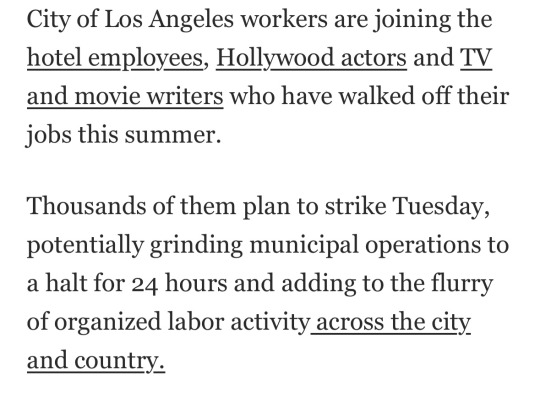
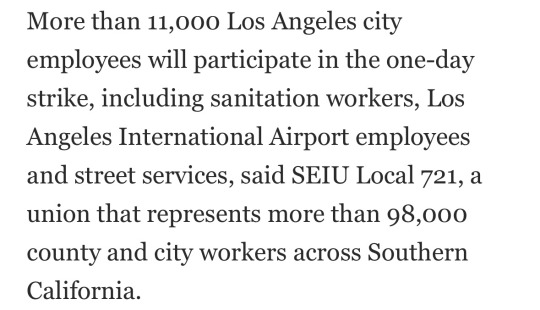
Source
Let’s go
#unions#unionize#labor#workers#workers rights#solidarity#capitalism#California#government#the left#progressive#current events#news
19K notes
·
View notes
Photo

41K notes
·
View notes
Note
Hi- er, this is my first-ever writer's strike, how does one not cross a picket line in this context? I know how not to do it with things like Amazon and IRL strikes, but how does it apply to media/streaming?
Hi, this is a great question, because it allows me to write about the difference between honoring a picket line and a boycott. (This is reminding me of the labor history podcast project that's lain fallow in my drafts folder for some time now...) In its simplest formulation, the difference between a picket line and a boycott is that a picket line targets an employer at the point of production (which involves us as workers), whereas a boycott targets an employer at the point of consumption (which involves us as consumers).
So in the case of the WGA strike, this means that at any company that is being struck by the WGA - I've seen Netflix, Amazon, Apple, Disney, Warner Brothers Discovery, NBC, Paramount, and Sony mentioned, but there may be more (check the WGA website and social media for a comprehensive list) - you do not cross a picket line, whether physical or virtual. This means you do not take a meeting with them, even if its a pre-existing project, you do not take phone calls or texts or emails or Slacks from their executives, you do not pitch them on a spec script you've written, and most of all you do not answer any job application.
Because if this strike is like any strike since the dawn of time, you will see the employers put out ads for short-term contracts that will be very lucrative, generally above union scale - because what they're paying for in addition to your labor is you breaking the picket line and damaging the strike - to anyone willing to scab against their fellow workers. GIven that one of the main issues of the WGA are the proliferation of short-term "mini rooms" whereby employers are hiring teams of writers to work overtime for a very short period, to the point where they can only really do the basics (a series outline, some "broken stories," and some scripts) and then have the showrunner redo everything on their lonesome, while not paying writers long-term pay and benefits, I would imagine we're going to see a lot of scab contracts being offered for these mini rooms.
But for most of us, unless we're actively working as writers in Hollywood, most of that isn't going to be particularly relevant to our day-to-day working lives. If you're not a professional or aspiring Hollywood writer, the important thing to remember honoring the picket line doesn't mean the same thing as a boycott. WGA West hasn't called on anyone to stop going to the movies or watching tv/streaming or to cancel their streaming subscriptions or anything like that. If and when that happens, WGA will go to some lengths to publicize that ask - and you should absolutely honor it if you can - so there will be little in the way of ambiguity as to what's going on.
That being said, one of the things that has happened in the past in other strikes is that well-intentioned people get it into their heads to essentially declare wildcat (i.e, unofficial and unsanctioned) boycotts. This kind of stuff comes from a good place, someone wanting to do more to support the cause and wanting to avoid morally contaminating themselves by associating with a struck company, but it can have negative effects on the workers and their unions. Wildcat boycotts can harm workers by reducing back-end pay and benefits they get from shows if that stuff is tied to the show's performance, and wildcat boycotts can hurt unions by damaging negotiations with employers that may or may not be going on.
The important thing to remember with all of this is that the strike is about them, not us. Part of being a good ally is remembering to let the workers' voices be heard first and prioritizing being a good listener and following their lead, rather than prioritizing our feelings.
28K notes
·
View notes
Text
All bets are off
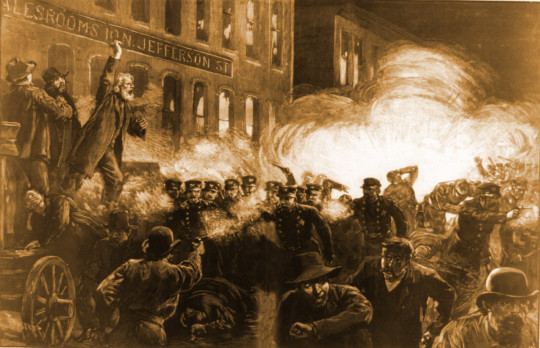
When unions are outlawed, only outlaws will have unions. Unions don't owe their existence to labor laws that protect organizing activities. Rather, labor laws exist because once-illegal unions were formed in the teeth of violent suppression, and those unions demanded – and got – labor law.
Bosses have hated unions since the start, and they've really hated laws protecting workers. Dress this up in whatever self-serving rationale you want – "the freedom to contract," or "meritocracy" – it all cashes out to this: when workers bargain collectively, value that would otherwise go to investors and executives goes to the workers.
I'm not just talking about wages here, either. If an employer is forced – by a union, or by a labor law that only exists because of union militancy – to operate a safe workplace, they have to spend money on things like fire suppression, PPE, and paid breaks to avoid repetitive strain injuries. In the absence of some force that corrals bosses into providing these safety measures, they can use that money to pay themselves, and externalize the cost of on-the-job injuries to their workers.
The cost and price of a good or service is the tangible expression of power. It is a matter of politics, not economics. If consumer protection agencies demand that companies provide safe, well-manufactured goods, if there are prohibitions on price-fixing and profiteering, then value shifts from the corporation to its customers.
Now, if labor has few rights and consumers have many rights, then bosses can pass their consumer-side losses on to their workers. This is the Walmart story, the Amazon story: cheap goods paid for with low wages and dangerous working conditions. Likewise, if consumer rights are weak but labor rights are strong, then bosses can pass their costs onto their customers, continuing to take high profits by charging more. This is the story of local gig-work ordinances like NYC's, which guaranteed a minimum wage to delivery drivers – restaurateurs responded by demanding the right to add a surcharge to their bills:
https://table.skift.com/2018/06/22/nyc-surcharge-debate/
But if labor and consumer groups act in solidarity, then they can operate as a bloc and bosses and investors have to eat shit. Back in 2017, the pilots' union for American Airlines forced their bosses into a raise. Wall Street freaked out and tanked AA's stock. Analysts for big banks were outraged. Citi's Kevin Crissey summed up the situation perfectly, in a fuming memo: "This is frustrating. Labor is being paid first again. Shareholders get leftovers":
https://www.vox.com/new-money/2017/4/29/15471634/american-airlines-raise
Limiting the wealth of the investor class also limits their power, because money translates pretty directly into political power. This sets up a virtuous cycle: the less money the investor class has to spend on political projects, the more space there is for consumer- and labor-protection laws to be enacted and enforced. As labor and consumer law gets more stringent, the share of the national income going to people who make things, and people who use the things they make, goes up – and the share going to people who own things goes down.
Seen this way, it's obvious that prices and wages are a political matter, not an "economic" one. Orthodox economists maintain the pretense that they practice a kind of physics of money, discovering the "natural," "empirical" way that prices and wages move. They dress this up with mumbo-jumbo like the "efficient market hypothesis," "price discovery," "public choice," and that old favorite, "trickle-down theory." Strip away the doublespeak and it boils down to this: "Actually, your boss is right. He does deserve more of the value than you do":
https://pluralistic.net/2024/09/09/low-wage-100/#executive-excess
Even if you've been suckered by the lie that bosses have a legal "fiduciary duty" to maximize shareholder returns (this is a myth, by the way – no such law exists), it doesn't follow that customers or workers share that fiduciary duty. As a customer, you are not legally obliged to arrange your affairs to maximize the dividends paid by to investors in your corporate landlord or by the merchants you patronize. As a worker, you are under no legal obligation to consider shareholders' interests when you bargain for wages, benefits and working conditions.
The "fiduciary duty" lie is another instance of politics masquerading as economics: even if bosses bargain for as big a slice of the pie as they can get, the size of that slice is determined by the relative power of bosses, customers and workers.
This is why bosses hate unions. It's why the scab presidency of Donald Trump has waged all-out war on unions. Trump just effectively shuttered the National Labor Relations Board, unilaterally halting its enforcement actions and investigations. He also illegally fired one of the Democratic NLRB board members, leaving the agency with too few board members to take any new actions, meaning that no unions can be recognized – indeed, the NLRB can't do anything – for the foreseeable future:
https://www.npr.org/2025/01/28/nx-s1-5277103/nlrb-trump-wilcox-abruzzo-democrats-labor
Trump also fired the NLRB's outstanding General Counsel, Jennifer Abruzzo, who was one of the stars of the Biden administration, who promulgated rules that decisively tilted the balance in favor of labor:
https://pluralistic.net/2023/09/06/goons-ginks-and-company-finks/#if-blood-be-the-price-of-your-cursed-wealth
Trump is playing Grinch here – he's descended upon Whoville to take all the Christmas decorations, in the belief that these are the source of Christmas. But the Grinch was wrong (and so is Trump): Christmas was in the heart of the Whos, and the tinsel and baubles were the expression of that Christmas spirit. Likewise, labor rights come from labor organizing, not the other way around.
Labor rights were enshrined in federal law in 1935, with the National Labor Relations Act. Bosses hated – and hate – the NLRA. 12 years later, they passed the Taft-Hartley Act, which substantially gutted the NLRA. Most notably, Taft-Hartley bans "sympathy strikes" – when unions walk out in support of one another. Sympathy strikes are a hugely powerful way for workers to claim value away from bosses and investors, which is why bosses got rid of them.
But even then, bosses who were honest with themselves would admit that they preferred life under the NLRA to life before it. Remember: labor militancy created the NLRA, not the other way around. When workers didn't have the legal means to organize, they organized by illegal means. When they didn't have legal ways of striking, they struck illegally. The result was pitched battles, even bloodbaths, as cops beat and even killed labor organizers. Bosses hired thugs who committed mass murder – literally. In 1913, strikebreakers working for the Calumet and Hecla Mining Company started a stampede during a union Christmas party that killed 73 people, including many copper miners' children:
https://en.wikipedia.org/wiki/Italian_Hall_disaster
Workers didn't take this lying down. Violence was met with violence. Bombs went off outside factories and stately mansions. There was gunfire and arson. Bosses had to hire armed guards to escort them as they scurried between their estates and their fancy parties and their executive offices. The country was in a state of near-perpetual chaos.
The NLRA created a set of rules for labor/boss negotiations – rules that helped workers claim a bigger slice of the pie without blood in the streets. But the NLRA also had benefits for bosses: unions were obliged to play by its rules, if they wanted to reap its benefits. The NLRA didn't just put a ceiling over boss power – it also put a ceiling over worker militancy. Von Clausewitz says that "war is politics by other means," which implies that politics are war by other means. The alternative to politics isn't capitulation, it's war.
Trump has torn up the rules to the labor game, but that doesn't mean the game ends. That just means there are no rules.
The labor movement has many great organizer/writers, but few can match the incredible Jane McAlevey, who died of cancer last summer (rest in power). In her classic A Collective Bargain, McAlevey describes her organizer training, from a tradition that went back to the days before the National Labor Relations Act:
https://pluralistic.net/2023/04/23/a-collective-bargain/
McAlevey was very clear that labor law owes its existence to union power, not the other way around. She explains very clearly that union organizers invented labor law after they invented unions, and that unions can (and indeed, must) exist separately from government agencies that are charged with protecting labor law. But she goes farther: in Collective Bargain, McAlevey describes how the 2019 LA Teachers' Strike didn't just win all the wage and benefits demands of the teachers, but also got the school district to promise to put a park or playground near every school in the system, and got a ban on ICE agents harassing parents at the school gates.
This wildly successful strike forged bonds among teachers, and between teachers and their communities. These teachers went on to run a political get-out-the-vote campaign in the 2020 elections and elected two Democratic reps to Congress and secured the Dems' majority. McAlevey contrasted the active way good unions involve workers as participants with the thin, anemic way that the Democratic Party engages with supporters – solely by asking them for money in a stream of frothing, clickbait text messages. As McAlevey wrote, "Workplace democracy is a training ground for true national democracy."
Militant labor doesn't just protect labor rights – it protects human rights. Remember: MLK, Jr was assassinated while campaigning for union janitors in Memphis. LA teachers ended ICE sweeps at the school gates. Librarian unions are leading the fight against book bans.
The good news is that public opinion has swung wildly in favor of unions over the past decade. More people want to join unions than at any time in generations. More people support unions that at any time in generations.
The bad news is that union leadership fucking suuuuuuuucks. As Hamilton Nolan writes, union bosses are sitting on vast, heretofore unseen warchests of cash, and they just experienced a four-year period of governmental support for unions unheard of since the Carter administration, and they did fuck all with that opportunity:
https://www.hamiltonnolan.com/p/confirmed-unions-squandered-the-biden
Big unions have effectively stopped trying to organize new workers, even when workers beg them for help forming a union. Union organizing budgets are so small as to be indistinguishable from zero. Despite the record number of workers who want to be in a union, the number of workers who are in a union actually fell during the Biden years.
Indeed, some union bosses actually campaigned for Trump, a notorious scab. Teamsters boss Sean O'Brien spoke at the fucking RNC, a political favor that Trump repaid by killing the NLRB and every labor enforcement action and investigation in the country. Nice one, O'Brien. See you in hell:
https://www.theatlantic.com/politics/archive/2024/08/teamster-union-trump/679513/
Union bosses squandered a historical opportunity to build countervailing power. Now, Trump's stormtroopers are rounding up workers with the goal of illegally deporting them. Fascism is on the rise. Labor and fascism are archenemies. Organized labor has always been the biggest threat to fascism, every time it has reared its head. That's why fascists target unions first. Union bosses cost us an organized force that could effectively defend our friends and neighbors from Trump's deportation stormtroopers:
https://prospect.org/blogs-and-newsletters/tap/2025-01-28-trumps-lawbreaking-also-aimed-at-workers/
Not every union boss is a scab like O'Brien. Shawn Fain, head of the UAW, won an historic strike against all three of the Big Three automakers, and made sure that the new contracts all ran out in 2028, and called on other unions to do the same, so that the country could have a general strike in 2028 without violating the Taft-Hartley Act (Fain was operating on the now-dead assumption that unions had to play by the rules):
https://pluralistic.net/2024/11/11/rip-jane-mcalevey/#organize
A general strike isn't just a strike for workers' rights. Under Trump, a general strike is a strike against Trumpism and all its horrors: kids in cages, forced birth, trans erasure, climate accelerationism – the whole fucking thing.
A general strike would build the worker power to occupy the Democratic Party and force it to stand up for the American people against oligarchy, rather than meekly capitulating to fascism (and fundraising), which is all they know how to do anymore:
https://pluralistic.net/2025/01/10/smoke-filled-room-where-it-happens/#dinosaurs
But before we can occupy the Dems, we have to occupy the unions. We need union bosses who are committed to signing up every worker who wants workplace democracy, and unionizing every workplace in spite of the NLRB, not with its help. We need to go back to our roots, when there were no rules.
That's the world Trump made. We need to make him regret that decision.

If you'd like an essay-formatted version of this post to read or share, here's a link to it on pluralistic.net, my surveillance-free, ad-free, tracker-free blog:
https://pluralistic.net/2025/01/29/which-side-are-you-on/#strike-three-yer-out
#pluralistic#labor#nlra#nlrb#jennifer abruzzo#national labor relations board#national labor relations act#unions#organize#general strike#general strike 2028
2K notes
·
View notes
Text
Do you guys notice how when Shawn Fain, president of the United Auto Workers union, started planning a general strike, he did it by a) targeting his messaging towards unions with the ability to safely and effectively strike in large numbers, b) laid out a clear, actionable plan for those unions to follow (setting contracts to all expire at the same time, since many unions cannot strike while under contract), c) is using union contracts to set clear, actionable demands that can be met in order to gauge success and provide an end goal, and d) started organizing FOUR YEARS before the proposed strike date to give people the chance to plan accordingly, because it takes a really freaking long time to get tens of millions of people organized?
You notice how he didn't do it by slapping a message on Twitter saying 'hey nobody go to work on Monday, that'll really show 'em'?
#those 'monday is a general strike stay home if you can!!!' posts are SO performative and they really annoy me#like. you MUST know you can't organize a general strike of tens of millions of people by sharing an infographic on twitter. Right?#don't even get me started on the most recent one that was like 'we understand the last strike only gave one day of notice'#'so this time we're giving you two! strike is on tuesday everyone don't forget!'#like GENUINELY was that supposed to be a joke#the linked article also touches on how difficult actual organizing a workplace is which is nice#because they mention previous failed attempts in which organizers basically just handed out leaflets#and assumed the benefits would be obvious. which i think is basically the equivalent of posting an infographic on twitter#which is to say - not effective at all. Organizing is a LOT of work! Running an effective union even more so!#labor rights
6K notes
·
View notes